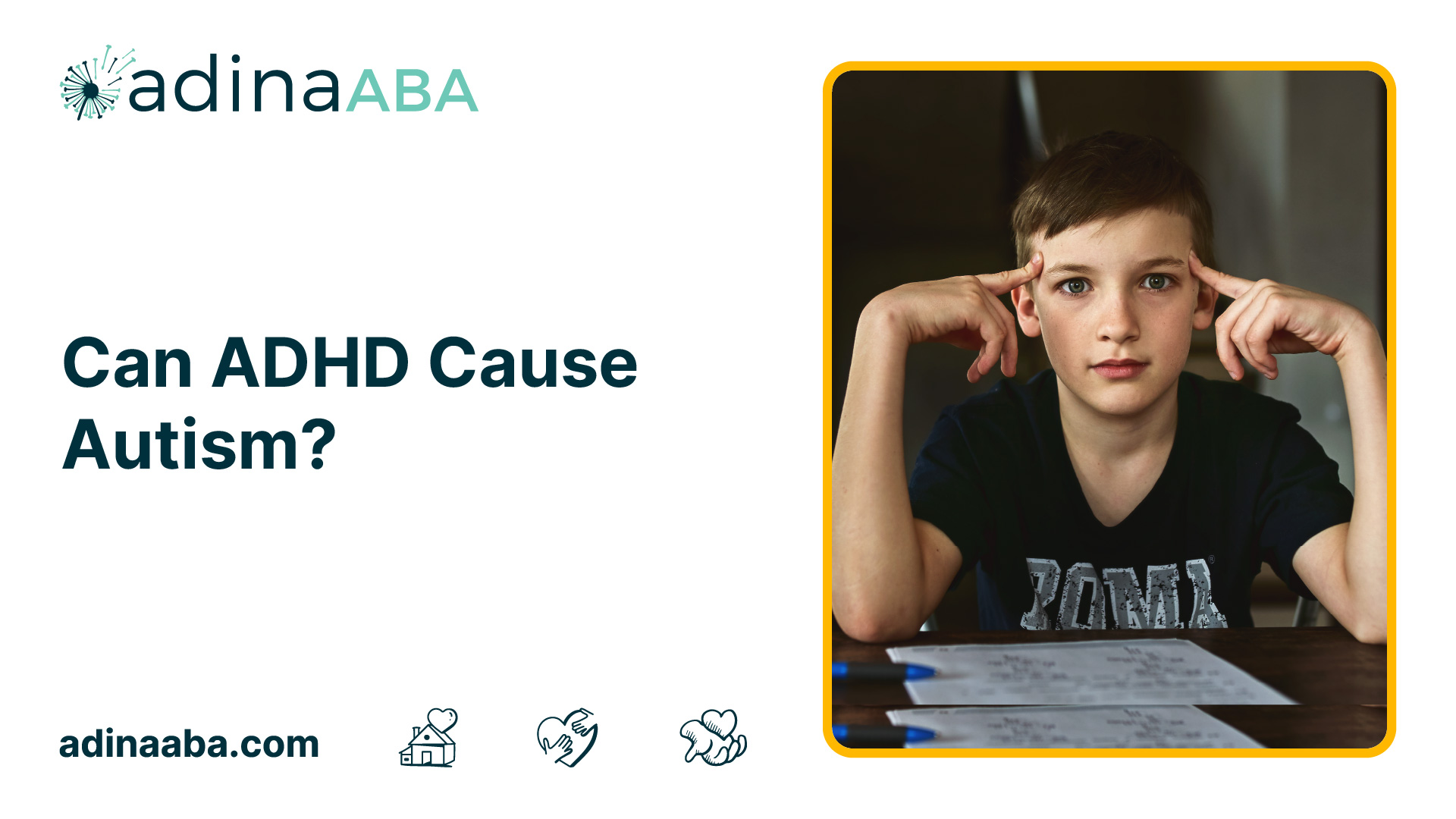Can ADHD Cause Autism?
.jpg)

Understanding ADHD and Autism
To comprehend the relationship between ADHD and autism, it is essential to have a clear understanding of each condition individually. This section will provide an overview of ADHD, autism, and the relationship between the two.
What is ADHD?
ADHD, or Attention-Deficit/Hyperactivity Disorder, is a neurodevelopmental disorder that commonly manifests during childhood. Individuals with ADHD often struggle with attention, impulsivity, and hyperactivity. The core symptoms of ADHD include:
- Inattention: Difficulty sustaining attention, being easily distracted, and struggling to organize tasks.
- Hyperactivity: Restlessness, excessive talking, and difficulty staying still.
- Impulsivity: Acting without thinking, interrupting others, and difficulty waiting for turns.
ADHD affects people of all ages and can have a significant impact on various aspects of their lives, including academics, work, and relationships.
What is Autism?
Autism, also known as Autism Spectrum Disorder (ASD), is a developmental disorder that affects communication, social interaction, and behavior. Autism is characterized by a range of symptoms, which can vary greatly from person to person. Some common features of autism include:
- Social Challenges: Difficulty with nonverbal communication, understanding social cues, and developing and maintaining relationships.
- Communication Differences: Delayed speech and language skills, repetitive language patterns, and difficulty with understanding and using gestures.
- Restricted and Repetitive Behaviors: Engaging in repetitive movements, having intense interests in specific topics, and being resistant to changes in routines.
Autism is a spectrum disorder, meaning that individuals can present with a wide range of abilities and challenges.
Overview of the Relationship Between ADHD and Autism
There is a considerable overlap between ADHD and autism, with research suggesting a connection between the two conditions. Studies have shown that individuals with autism are at a higher risk of also having ADHD, and vice versa. However, it is important to note that not all individuals with ADHD have autism, and not all individuals with autism have ADHD.
The relationship between ADHD and autism is complex and multifaceted. While the exact mechanisms are not fully understood, there are overlapping genetic and environmental factors that may contribute to the co-occurrence of these conditions. It is also worth noting that individuals with both ADHD and autism may experience more significant challenges in areas such as social interaction, communication, and executive functioning.
Understanding the relationship between ADHD and autism is crucial for accurate diagnosis and effective treatment. By recognizing the unique characteristics and challenges associated with each condition, healthcare professionals can provide comprehensive support and interventions tailored to the individual's needs.
Can ADHD Influence Autism Development?
The relationship between ADHD and autism is a topic of ongoing research and discussion. While ADHD and autism are distinct neurodevelopmental disorders, there is evidence to suggest that they can co-occur and share some similarities. In this section, we will explore the research findings and common symptom overlap between ADHD and autism.
Research Findings
Numerous studies have examined the potential influence of ADHD on autism development. While the exact nature of the relationship is complex and not fully understood, research has uncovered some interesting findings.
One study published in the Journal of Autism and Developmental Disorders found that individuals with ADHD were more likely to have autistic traits compared to those without ADHD. Another study published in the Journal of Developmental and Behavioral Pediatrics reported a higher prevalence of ADHD symptoms in children with autism compared to children without autism.
These findings suggest a potential link between ADHD and autism, indicating that individuals with ADHD may have an increased risk of developing autistic traits or meeting the criteria for an autism diagnosis. However, it is important to note that not all individuals with ADHD will develop autism, and vice versa.
Common Symptoms Overlap
ADHD and autism share some common symptoms, which can contribute to diagnostic challenges and potential confusion. Both conditions can involve difficulties with attention, impulse control, and social interactions. However, there are also notable differences between the two disorders.
To better understand the symptom overlap, let's compare the commonly observed features of ADHD and autism:
As shown in the table, symptoms related to attention, hyperactivity, and impulsivity are commonly associated with ADHD. On the other hand, social communication challenges, restricted and repetitive behaviors, and sensory sensitivities are typically more prevalent in autism.
The overlapping symptoms can make it difficult to differentiate between the two conditions, especially when individuals exhibit a combination of ADHD and autistic traits. This highlights the importance of a thorough evaluation by healthcare professionals experienced in diagnosing neurodevelopmental disorders.
While ADHD may influence the development or presence of autism traits, it is essential to recognize that they are separate conditions with their own distinct diagnostic criteria and treatment approaches. Proper assessment and understanding of the individual's unique profile are crucial for effective intervention strategies.
In the next section, we will explore the genetic and environmental factors that contribute to the development of ADHD and autism.
Genetic and Environmental Factors
When exploring the relationship between ADHD and autism, it is important to consider both genetic and environmental factors that may contribute to the development of these conditions.
Genetic Links Between ADHD and Autism
Research suggests that there are genetic links between ADHD and autism. Studies have shown that individuals with autism are more likely to have a family history of ADHD, and vice versa. Shared genetic factors may contribute to the co-occurrence of these conditions.
It is important to note that having a family history of ADHD does not guarantee the development of autism, and vice versa. Genetic factors are complex and can interact with other environmental influences to influence the development of these conditions.
Environmental Influences on Development
While genetics play a role, environmental factors also contribute to the development of ADHD and autism. Certain prenatal and early life factors have been associated with an increased risk of both conditions.
Environmental factors that may influence the development of ADHD and autism include:
- Maternal smoking during pregnancy
- Exposure to certain toxins or chemicals
- Premature birth or low birth weight
- Maternal stress during pregnancy
- Parental age at the time of conception
It's important to note that these factors alone are not definitive causes of ADHD or autism. They may increase the risk, but not every individual exposed to these factors will develop the conditions.
Understanding the interplay between genetic and environmental factors is crucial in comprehending the complex relationship between ADHD and autism. Further research is needed to gain a deeper understanding of these influences and their impact on neurodevelopment.
By studying the genetic and environmental factors associated with ADHD and autism, researchers can gain valuable insights into the underlying mechanisms and potential strategies for prevention and intervention.
Diagnosis and Treatment Approaches
When it comes to the co-occurrence of ADHD and autism, accurate diagnosis and appropriate treatment approaches are essential for effective management. In this section, we will explore the challenges in diagnosing both conditions and discuss treatment strategies for individuals with co-occurring ADHD and autism.
Challenges in Diagnosis
Diagnosing ADHD and autism can be complex due to several factors. Both conditions share certain symptoms, which can lead to diagnostic confusion or misinterpretation. Additionally, symptoms can present differently in each individual, making it challenging to establish a clear diagnosis.
To diagnose ADHD, healthcare professionals typically rely on diagnostic criteria outlined in the Diagnostic and Statistical Manual of Mental Disorders (DSM-5). However, when it comes to autism, diagnosis involves a comprehensive assessment that includes observing behavior across different settings and analyzing developmental history.
To complicate matters further, the presence of one condition can mask or overshadow symptoms of the other, leading to potential underdiagnosis or misdiagnosis. It is crucial to consult with a qualified healthcare professional who specializes in neurodevelopmental disorders to ensure an accurate diagnosis.
Treatment Strategies for Co-occurring ADHD and Autism
When ADHD and autism co-occur, treatment approaches need to address the unique needs of each condition while considering the potential interactions between them. Here are some strategies commonly employed:
- Behavioral Therapy: Behavioral interventions, such as Applied Behavior Analysis (ABA), can help individuals with ADHD and autism develop specific skills, manage impulsivity, and improve social interactions.
- Medication: Medication may be considered for managing symptoms of ADHD, such as hyperactivity, impulsivity, and attention difficulties. However, it's important to note that medication may not directly target autism symptoms.
- Educational Support: Individualized education plans (IEPs) or 504 plans can be implemented to accommodate the learning needs of individuals with co-occurring ADHD and autism. These plans may include classroom modifications, specialized instruction, and additional support services.
- Parent and Teacher Training: Training programs can empower parents and teachers to effectively support individuals with co-occurring ADHD and autism. These programs provide strategies for behavior management, communication skills, and creating structured environments.
- Multidisciplinary Approach: Collaborative efforts among healthcare professionals, educators, therapists, and families are crucial for comprehensive and holistic care. This approach ensures that individuals receive consistent support across different settings.
It's important to remember that treatment should be tailored to the unique needs of each individual. What works for one person may not be as effective for another. Regular monitoring, assessment, and adjustments to treatment plans are essential to optimize outcomes.
By addressing the challenges in diagnosis and employing appropriate treatment strategies, individuals with co-occurring ADHD and autism can receive the support they need to thrive and reach their full potential.
Support and Resources
Individuals with ADHD and autism can benefit from various support groups, communities, and educational resources that provide valuable information, guidance, and a sense of community. These resources aim to assist individuals, their families, and caregivers in understanding and managing the challenges associated with ADHD and autism.
Support Groups and Communities
Support groups and communities play a vital role in providing a supportive environment for individuals with ADHD and autism. These groups offer a platform for individuals and their families to connect with others who share similar experiences and challenges. Through sharing stories, strategies, and advice, support groups provide a sense of understanding and solidarity. These groups may be available both online and in-person, allowing individuals to access support from the comfort of their own homes or within their local communities.
Educational Resources for Individuals with ADHD and Autism
Education is crucial for individuals with ADHD and autism, as well as their families and caregivers. Understanding these conditions and learning effective strategies for managing symptoms can greatly enhance the quality of life for individuals with ADHD and autism.
There are numerous educational resources available, ranging from websites and online forums to books and workshops. These resources provide valuable information about the characteristics, diagnosis, treatment options, and everyday challenges associated with ADHD and autism. They also offer guidance on effective communication techniques, behavior management strategies, and educational support.
Additionally, educational resources may include information on assistive technologies, visual aids, and specialized programs that can aid individuals with ADHD and autism in their daily lives. These resources empower individuals and their support networks with the knowledge and tools necessary to navigate the unique challenges that come with ADHD and autism.
When seeking educational resources, it is important to consider reputable sources such as established organizations, medical professionals, and recognized experts in the field of ADHD and autism. These sources can provide reliable and evidence-based information to ensure individuals receive accurate and up-to-date guidance.
By utilizing support groups and educational resources, individuals with ADHD and autism can access valuable knowledge, support, and guidance. These resources assist individuals and their families in navigating the complexities of these conditions, ultimately promoting improved well-being and quality of life.
Sources
https://www.crossrivertherapy.com/autism/can-adhd-cause-autism
https://www.discoveryaba.com/aba-therapy/can-adhd-cause-autism
More Resources
Expert Clinicians
Get started today ->



.jpg)


.jpg)